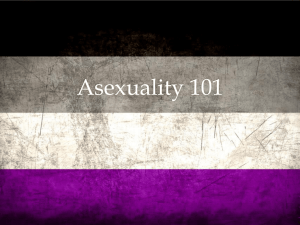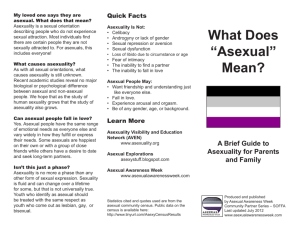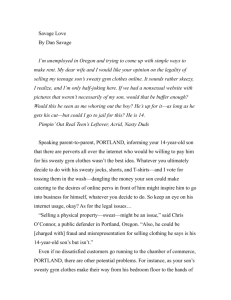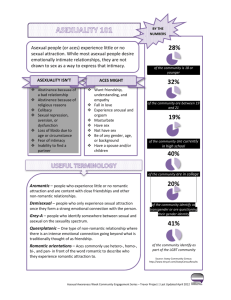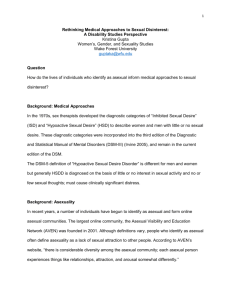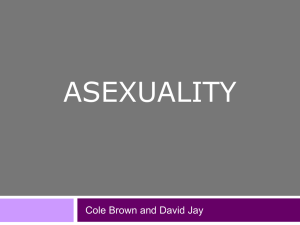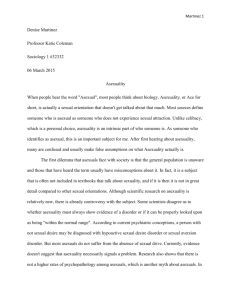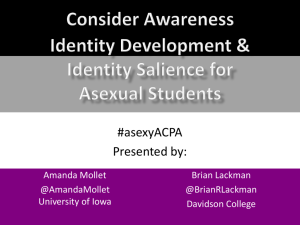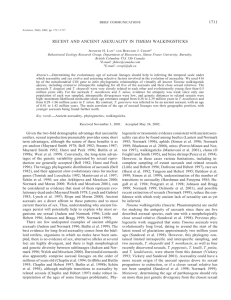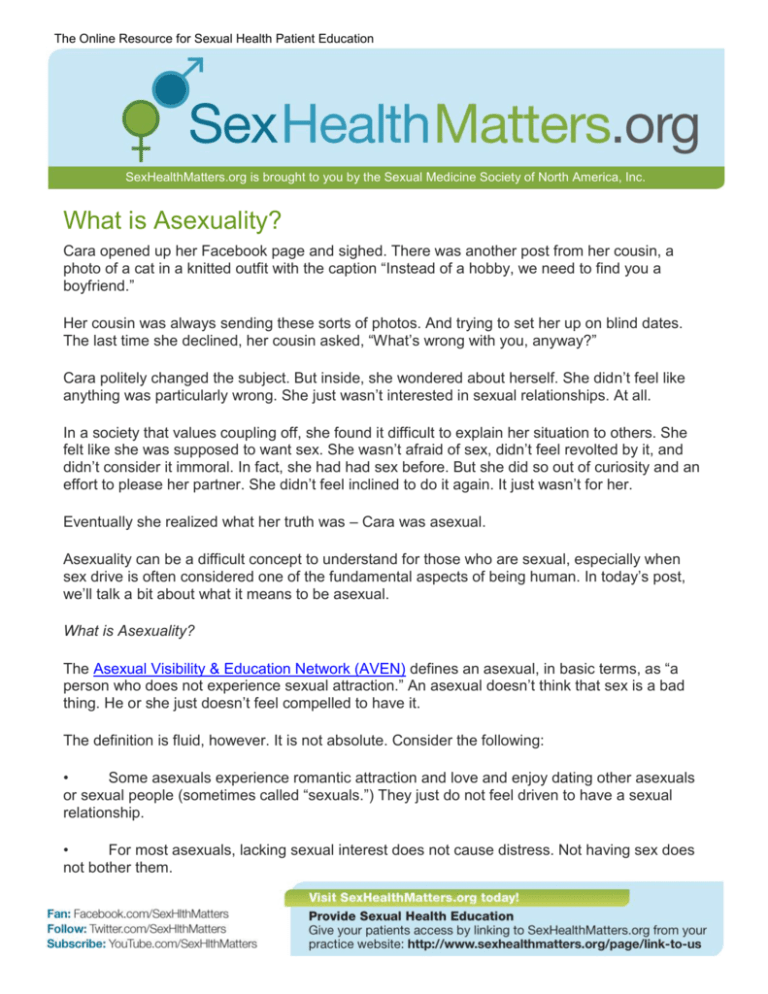
The Online Resource for Sexual Health Patient Education
SexHealthMatters.org is brought to you by the Sexual Medicine Society of North America, Inc.
What is Asexuality?
Cara opened up her Facebook page and sighed. There was another post from her cousin, a
photo of a cat in a knitted outfit with the caption “Instead of a hobby, we need to find you a
boyfriend.”
Her cousin was always sending these sorts of photos. And trying to set her up on blind dates.
The last time she declined, her cousin asked, “What’s wrong with you, anyway?”
Cara politely changed the subject. But inside, she wondered about herself. She didn’t feel like
anything was particularly wrong. She just wasn’t interested in sexual relationships. At all.
In a society that values coupling off, she found it difficult to explain her situation to others. She
felt like she was supposed to want sex. She wasn’t afraid of sex, didn’t feel revolted by it, and
didn’t consider it immoral. In fact, she had had sex before. But she did so out of curiosity and an
effort to please her partner. She didn’t feel inclined to do it again. It just wasn’t for her.
Eventually she realized what her truth was – Cara was asexual.
Asexuality can be a difficult concept to understand for those who are sexual, especially when
sex drive is often considered one of the fundamental aspects of being human. In today’s post,
we’ll talk a bit about what it means to be asexual.
What is Asexuality?
The Asexual Visibility & Education Network (AVEN) defines an asexual, in basic terms, as “a
person who does not experience sexual attraction.” An asexual doesn’t think that sex is a bad
thing. He or she just doesn’t feel compelled to have it.
The definition is fluid, however. It is not absolute. Consider the following:
•
Some asexuals experience romantic attraction and love and enjoy dating other asexuals
or sexual people (sometimes called “sexuals.”) They just do not feel driven to have a sexual
relationship.
•
For most asexuals, lacking sexual interest does not cause distress. Not having sex does
not bother them.
The Online Resource for Sexual Health Patient Education
SexHealthMatters.org is brought to you by the Sexual Medicine Society of North America, Inc.
•
Some asexuals do have sex because their partners want it. This may be an aspect of the
relationship that the couple negotiates. Asexuals don’t necessarily dislike sex. They might just
feel neutral about it.
•
Some asexuals do enjoy sex because of the intimacy they share with a partner. However,
the enjoyment does not come from a drive to have sex.
•
Some asexuals do have sexual fantasies and masturbate because it brings them
pleasure. However, these experiences stay in the realm of fantasy. They would not feel sexual if
the fantasy were happening in real life.
A Spectrum
Like other aspects of sexuality, asexuality is a spectrum. Some asexuals have sexual feelings
from time to time. For example, demisexuals feel sexual attraction only after they’ve formed an
emotional bond with someone. A gray-asexual (also called gray-sexual or gray-a) feels sexual
attraction very seldom, to a very small degree, or only in certain circumstances. In contrast, nonlibidoists are asexuals that never have sexual feelings.
It’s also possible for a person to feel asexual a certain period of time, then sexual for another
span of time.
As AVEN explains on its website, “There is no litmus test to determine if someone is asexual.
Asexuality is like any other identity – at its core, it’s just a word that people use to help figure
themselves out. If at any point someone finds the word asexual useful to describe themselves,
we encourage them to use it for as long as it makes sense to do so.”
Resources
The Asexual Visibility & Education Network
“Family/Friends FAQ”
http://www.asexuality.org/home/family.html
“General FAQ”
http://www.asexuality.org/home/general.html
“Overview”
http://www.asexuality.org/home/overview.html
2
The Online Resource for Sexual Health Patient Education
SexHealthMatters.org is brought to you by the Sexual Medicine Society of North America, Inc.
“Relationship FAQ”
http://www.asexuality.org/home/relationship.html
The Atlantic
Hills, Rachel
“Life Without Sex: The Third Phase of the Asexuality Movement”
(April 2, 2012)
http://www.theatlantic.com/health/archive/2012/04/life-without-sex-the-third-phase-of-theasexuality-movement/254880/
Psychology Today
DePaulo, Bella, PhD
“ASEXUALS: Who Are They and Why Are They Important?”
(December 23, 2009)
http://www.psychologytoday.com/blog/living-single/200912/asexuals-who-are-they-and-why-arethey-important
Time
Decker, Julie Sondra
“How to Tell If You Are Asexual”
(June 18, 2014)
http://time.com/2889469/asexual-orientation/
3


